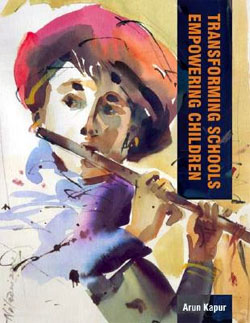Dec 20, 2025
Dec 20, 2025
Few would dispute the urgent need for fresh thinking as well as for a praxis in the field of education today. Arun Kapur's book, 'Transforming Schools - Empowering Children', meets this need to some extent. Even as school education is facing a crisis on many fronts, here is a thoughtful presentation by a well-known practicing educationist who seeks to discuss the salient features of 'a great school'. Issues discussed include the rationale and purpose of schools, individualized learning, curriculum design, models of assessment, teacher training, inclusive education, leadership and management. The author communicates the issues with ease, without jargon and with an ample number of explanatory illustrations.

The book facilitates a dialogue on teaching and learning, with an understanding that schools ought to keep pace with the emerging demands and challenges. The writer contends that schools should develop systems to prepare children to face the ever-increasing complexity of the workplace. By combining his experiences and expertise, Kapur comes up with a growth plan for all concerned - students, teachers, administration and parents.
A good school should empower both students and teachers. Teachers find their jobs immensely fulfilling if they reap rewards in terms of the palpable growth and positive development of their wards. If the core purpose of a school is "to enable students to learn how to prepare for life" then it can fulfill this purpose only by laying emphasis on the process of learning, rather than merely on content or short-term outcomes.
The writer insists that schools provide dynamic and multi-dimensional experiences to students, enabling them to explore the outer world and make connections with the inner self. Children should enjoy learning, becoming creators of knowledge, and learn to take informed decisions. The school must not position students as mere passive recipients of pre-packaged information. Rather, it must teach creativity, analytical skills and multiple abilities.
Kapur frankly critiques the board-based education system prevalent in India. He points out the flaws in curriculum, including rigid, often inaccurate and politically motivated content. He notes that the process of reform, though well meaning, is seriously flawed, since each reform recommendation is made in isolation, with little reference to the other aspects of the system.
Traditionally, curricula have been designed in a linear, disconnected fashion. Instead, they should be developed through the dynamic interaction of action and reflection. Curriculum, assessment and the teaching-learning process are closely integrated. Assessment methods based only on content knowledge degenerate into a vicious cycle of memorization exercises and examination orientation - something we are only too familiar with these days. To gauge the true capabilities of children, unique tools and methods should be devised. A true assessment will give an authentic picture of each student, not a set of meaningless statistics.
Central to the teaching-learning process is, of course, the quality of teachers. Competent teachers ensure that assessments are a cycle of continuous feedback, and they devise teaching methods based on the feedback. To an extent, schools should train teachers, in order to implement teaching processes in consonance with their philosophy. Kapur claims, for instance, that Vasant Valley School, New Delhi (where he is Director), conducts in-service teacher training, which includes sessions in child psychology, management of knowledge, and communication skills.
The book touches on inclusive education, wherein diversity within the classroom is handled in a humane and skilful manner, enriching the overall learning process and environment. It advises that individualized learning - catering to the diverse needs, capabilities and potential of each individual student - is important.
Parent-teacher interaction is another neglected facet that Kapur addresses. He notes that most parents want their child to be recognized as unique and to be nurtured by the school in a manner that is most appropriate to her or him. Schools, on the other hand, expect parents to have certain basic qualities that will have a positive influence on their child's ability to learn and adjust within the school's overall programme. An interaction between the two is conducive to the optimal development of the child.
While 'Transforming Schools...' is cogent and clear on many significant features of schooling, it sidesteps certain critical issues such as how schools can help overcome strong class, caste, communal and gender prejudices; or bring about a common school system in 'democratic' India; or effectively teach first-generation learners. With all its erudition and lucidity, the book remains confined to an exposition of how to run a good school within the ethos of elite, urban India.
08-Apr-2007
More by : Deepti Priya Mehrotra